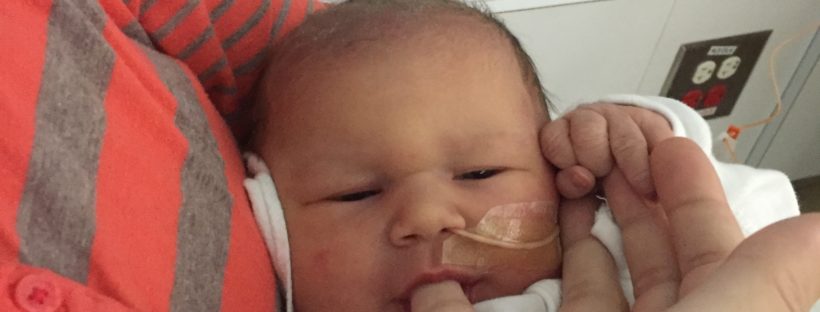By Paula
After undergoing five years of infertility, my son was born on November 27, 2012. He was a strong, healthy boy weighing in at 9 lbs 7 oz and 21 inches long. I had an easy pregnancy, no health issues and delivered him without any medication, without even an IV, with a midwife in a hospital.
He latched on and nursed, just as expected. However, because of his size he needed hourly blood sugar monitoring to be sure he’d maintain his sugars. The delivery nurse recommended giving him some formula after nursing to avoid the NICU. I also did skin to skin, his sugars stabilized enough that I was able to stop supplementing and he stopped getting the heel sticks a few hours after birth.
I breast fed him until he weaned at 15 months. I always was grateful to being able to use that formula to get us over the threat of low blood sugar (hypoglycemia). Though I always felt a bit of guilt from the breastfeeding community because he wasn’t exclusively breast fed, their gold standard.
Fast forward to February 27, 2015 at 12:30 am, my daughter was born. Another big baby, weighing in at 9 pounds 11 ounces and 23 inches long. I knew we’d deal with sugar issues again because of her size, despite being told Stella would be smaller than her big brother. I had no gestational diabetes with either pregnancy, and I’m 6 feet tall so was prepared for big babies. She was delivered easily once she got in the best position.
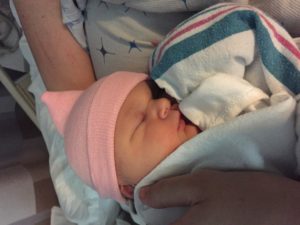
As soon as I tried to latch her on, I knew something was wrong. She couldn’t latch correctly. We tried for awhile and did skin to skin, knowing that she’d also have the heel sticks like her brother, I wanted to be sure her blood sugar was stabile. So I requested formula. We feed her formula in the labor and delivery room where we stayed for the next few hours.
Finally, I was transferred to postpartum around 5:30 am. Needless to say, I was exhausted after being up for about 24 hours straight and delivering. So my husband and I sent Stella to the nursery to so we could rest around 7 am. She was still labeled as a breastfed baby, even though she couldn’t latch and I doubt received any colostrum at the breast. Around 10 am the nurse brought Stella in to nurse, and told us she was fed in the nursery (but not how much). I tried to nurse her but again she couldn’t latch, and we gave her a bottle but she was having trouble with the nipple too.
The nurse took her back to the nursery for the pediatrician’s rounds. And while there her blood sugar was tested and was super low. The pediatrician admitted her to the NICU, where my daughter was given a feeding tube. We were told she would remain in the NICU until her sugars stabilized. She was received 3-4 ounces of formula through the NG feeding tube to keep her sugar stable.
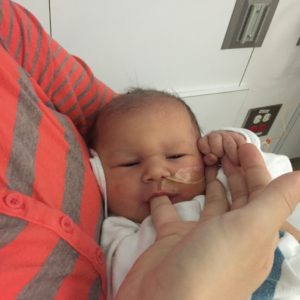
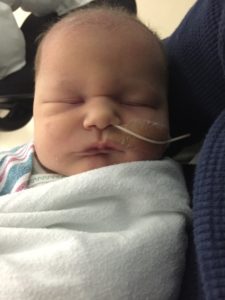
“But according to the lactation consultant, my daughter was being overfed in the NICU. As a mother, her words upset me and still upset me. Criticizing my daughter’s care in the NICU was upsetting, as well as the unsaid premise that breast feeding should be THE number one priority. “
Obviously, no mom plans a stay in the NICU. I imagined a nice bonding experience in recovery doing lots of skin to skin. Instead I was alone in my recovery room, with my breast pump. I’m lucky that by day 2 Stella was on my milk 100% plus fortifier to keep her sugar up.
My second day in post partum, the head IBCLC came in, Nancy M*********. She was impressed with the amount of milk I was pumping. When I explained how happy I was that Stella was able to maintain her blood sugar on 3-4 ounces of my milk; Nancy said, “That’s too much milk for a newborn.” I will never forget those words as I was very pleased Stella would not need an IV, that my milk was enough. But according to the lactation consultant, my daughter was being overfed in the NICU. As a mother, her words upset and still upset me. Criticizing my daughter’s care in the NICU was upsetting, as well as the unsaid premise that breast feeding should be THE number one priority. Not preventing my daughter from more pain with an IV (she had heel sticks before and after each NG feeding).
Fortunately the NICU staff were amazing, and so helpful. The speech pathologist was called in and diagnosed Stella’s posterior tongue tie which prevented her from latching at birth. It also caused her to have trouble latching onto the bottle nipples. We stayed 4 days in the NICU, the hospital was lovely and provided me with a free room for nursing mothers (I was pumping every 3 hours) so I was able to stay with Stella until she was released.
I later learned that when she stayed in the nursery between 7 am and 10 am, when we were told she was fed, the nursery only gave her 10 mls of formula which was in accordance to feeding a “breast fed” labeled baby. If I only knew then what I know now, I would never have labeled her as “breast fed” and maybe we would have avoided that NICU stay. As my daughter was basically only fed 10 mls of formula between 5 am when we fed her last in the recovery room, and 10 am when the pediatrician admitted her for hypoglycemia.
After we were released from the hospital, I continued to pump and bottle fed until I found an IBCLC who taught Stella and me how to do suck training. Stella went from getting about 1/2 an ounce at the breast to 3 ounces after 7 days of suck training. At 6 weeks old, I was finally able to nurse Stella at the breast. And I was able to donate 500 ounces of my frozen milk to another baby in need. I will always be thankful that formula was there for my son and I still regret that Stella did not receive the formula she needed to prevent her NICU stay. Stella went on to breast feed until she stopped on her own at 20 months and is now a happy, healthy 2 year old.
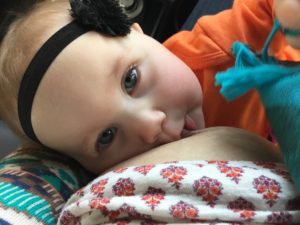
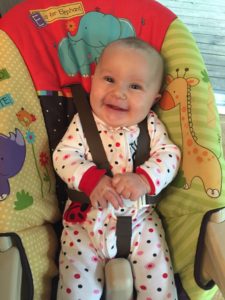
My pediatrician did say she thinks Stella would have put in the NICU due hypoglycemia regardless of if she had more than 10 mls of formula between 5 am and 10 am. I am not so sure and always think what if I didn’t send her to the nursery? What if I didn’t say I planned to breast feed? Would she have stayed in the NICU or would she have stayed in my arms?
#neonatalhypoglycemia #fedisbest
For more information on how to protect your baby from feeding complications due to early exclusive breastfeeding, please read and download the Fed is Best Feeding Plan, a way to communicate your feeding choices to your health care providers.
In addition, please read and download the Fed is Best Weighing Protocol to prevent newborn dehydration and failure to thrive.
Lastly, for more detailed information, please watch our educational videos on Preventing Feeding Complications.
Our full list of parent resources can be found on our Resource Page.

